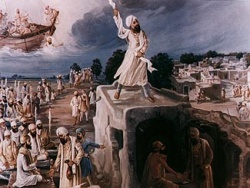Template:AOW134
Makhan Shah Labana, was a Gursikh who played an important part in Sikh history. He is the Sikh who is called The discoverer of the ninth Nanak, Guru Tegh Bahadur. He was a person who displayed honesty, patience, humility, wisdom, intelligence and deep belief in God.
There is confusion among historians about the birth of Makhan Shah Labana. In some records, it is said that Baba ji's birth was on 23 Harh 1676 bikrami, which translates to 1619. Labana Itihas (historical records) of Giani Gurnam Singh says the birth was in 1703 bikrami which translates to 1647. But according to their siblings, the former date is said to be correct.
Like the date of birth, there is also much confusions about the place of birth. Some historians says that he was born at Tanda in Jammu and Kashmir. "Twarikh Guru Khalsa" of Gian Gingh says that Baba ji was born at Tanda in Muzzafrabad. This is linked to the visit by Guru Hargobind, the sixth Sikh Guru in 1626. But Colonel Gurbachan Singh in his book Makhan Shah Labana proved that wrong and after much searching, discovered that there was no village called Tanda in Muzaffranagar.
Mostly scholars like Sukha Singh, Macauliffe and G.S Chabbra says that Baba Makhan Shah was native of Kathiawad, Gujrat, India. There are so many Labanas in Kathiawad till today and they call themselves Lohana. Labana is also derived from Lohana. So due to businessmen/trader it is said that Baba ji was born in kathiawad, Gujrat. Scholars like Teja Singh, Ganda Singh and Sewa Dass says that he was a Masand of that area but there is no evidence to support this. Also it is thought that a trader can't do two jobs (ie: trading and preaching) at same time as it is recognised that he had to travel frequently in connection with his work. .....More

